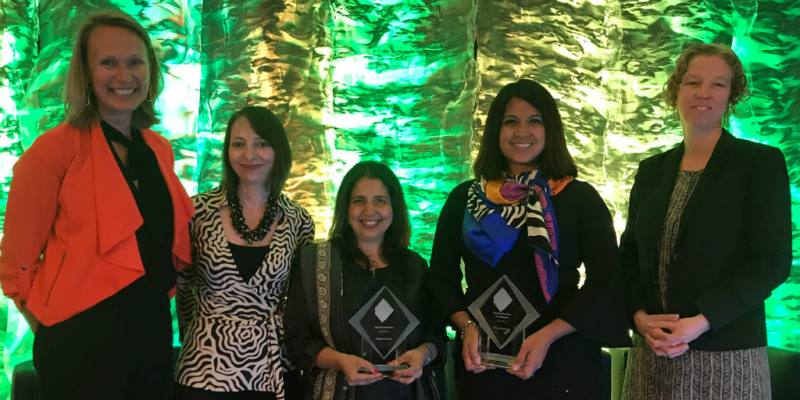This post, which originally appeared on the GlassPockets’ website, shares more about the #OpenForGood Award and its inaugural recipients. To read the complete post, please visit GlassPockets’ website.
Yesterday as part of the Grantmakers for Effective Organizations Learning Conference, Candid announced the inaugural recipients of the #OpenForGood Award, which is designed to recognize and encourage foundations to openly share what they learn so we can all get collectively smarter. The award, part of a larger #OpenForGood campaign started in 2017, includes a set of tools to help funders work more transparently including a GrantCraft Guide about how to operationalize knowledge sharing, a growing collection of foundation evaluations on IssueLab, and advice from peers in a curated blog series.
The three winning foundations each demonstrate an active commitment to open knowledge and share their evaluations through IssueLab, an open repository that is free, searchable, and accessible to all. Selected by an external committee from a globally sourced nomination process, the committee reviewed the contenders looking for evidence of an active commitment to open knowledge, creative approaches to making knowledge shareable, field leadership, and incorporating community insights into knowledge sharing work.
AND THE WINNERS ARE…

C&A Foundation
Award Summary: Creativity, Demonstrated Field Leadership, and Willingness to Openly Share Struggles
The C&A Foundation is a multi-national, corporate foundation working to fundamentally transform the fashion industry. C&A Foundation gives its partners financial support, expertise and networks so they can make the fashion industry work better for every person it touches. Lessons learned and impact for each of its programs are clearly available on its website, and helpful top-level summaries are provided for every impact evaluation making a lengthy narrative evaluation very accessible to peers, grantees and other stakeholders. C&A Foundation even provides such summaries for efforts that didn’t go as planned, packaging them in an easy-to-read, graphic format that it shares via its Results & Learning blog, rather than hiding them away and quietly moving on as is more often the case in the field.
The Ian Potter Foundation
Award Summary: Creativity, Field Leadership, and Lifting Up Community Insights
This foundation routinely publishes collective summaries from all of its grantee reports for each portfolio as a way to support shared learning among its existing and future grantees. It’s a refreshing reinvention of the traditional grantee report, placing priority on collecting and sharing the kinds of information that will be helpful to other practitioners, rather than questions to satisfy the typical ritual of a grant report that goes something like submit, data enter, file away never to be seen, and repeat.
Beyond being transparent with its grantee learning and reports, the Ian Potter Foundation also recently helped lift the burden on its grantees when it comes to measurement and outcomes. Instead of asking overworked charities to invent a unique set of metrics just for their grant process, foundation evaluation staff took it upon themselves to mine the Sustainable Development Goals targets framework to provide grantees with optional and ready-made outcomes templates that would work across the field for many funders. You can read more about that effort underway in a recent blog post here.
The Rockefeller Foundation
Award Summary: Field Leadership, Consistent Knowledge Sharing, and Commitment to Working Transparently
The Rockefeller Foundation can boast early adopter status to transparency and openness—it has had a longstanding commitment to creating a culture of learning and as such was one of the very first foundations to join the GlassPockets transparency movement and also to commit to #OpenForGood principles by sharing its published evaluations widely. Rockefeller Foundation also took the unusual step of upping the ante on the #OpenForGood Pledge aiming for both creating a culture of learning and accountability, with its monitoring and evaluation team stating that: “To ensure that we hold ourselves to a high bar, our foundation pre-commits itself to publicly sharing the results of its evaluations – well before the results are even known.” This ensures that even if the evaluation reports unfavorable findings, the intent is to share it all.

